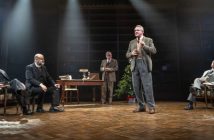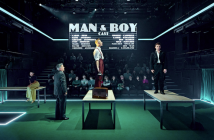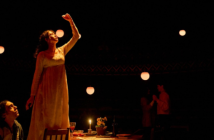How to describe Hydrocracker’s production of The New World Order? It was certainly not the passive theatrical experience to which one is accustomed. Set in the fictional Ministry of Cultural Integrity, where a ‘healthy, muscular and tender understanding of our cultural heritage’ is the order of the day, this production draws on five of Pinter’s later, politically motivated short plays, telling, in combination, the story of a political prisoner and the torture and mistreatment of him and his family at the hands of the fictional Ministry.

The venue, Shoreditch Town Hall, became the Ministry for the evening: instead of being ushered into an auditorium to have the play performed in front of you, the audience was plunged into the brutality of the piece the very start. Whether it was being searched by gum-chewing, aviator-wearing security guards on entry, having a flashlight shone in your face by a screaming soldier, or witnessing the aftermath of the rape of a female prisoner, it quickly became apparent the Ministry is not the sort of place you would want to find yourself.
The scene was set at a press conference, where the Minister (ex-head of the secret police) confesses, before a group of acquiescent journalists, to breaking the necks of children and raping women. In the Minister’s office, a bruised and  battered prisoner is taunted by the Minister, before being hauled down into the bowels of the building for more questioning. It is here, in the dank cellars, that the rest of the piece is played out, and a more unnerving theatrical experience I can scarcely imagine.
battered prisoner is taunted by the Minister, before being hauled down into the bowels of the building for more questioning. It is here, in the dank cellars, that the rest of the piece is played out, and a more unnerving theatrical experience I can scarcely imagine.
Moving through different set pieces, the audience witnessed the taunting of a prisoner by the sadistic guards, the savage brow beating of an old woman and the humiliation of a rape victim by the Minister, played with suitable menace by Hugh Ross, who stalked the corridors like a spider at the centre of his web. Key to the production is the reality of these scenes; any hint of pastiche or implausibility meant it would have descended into farce. To the credit of the actors and director, Ellie Jones, this never happened.
The other important component of the performance was the organisation and manipulation of the audience’s experience. After the descent into the cellars, we were split up into smaller groups by the guards, as if we too were prisoners. This was a particularly effective mechanism for delivering the various scenes on a more intimate level. The division also added to the sense of chaos and disorder in the cellars that evening, so that most of the performance was spent in the company of strangers, rather than friends and loved ones.
Perhaps the key question is whether anything was lost through this interactive staging of The New World Order in comparison with a more conventional theatrical experience. In this case, everything was gained. For a production framed around cruelty and oppression, being able to see, sense, smell and even taste the action only contributed to the impact.
Freedom of speech and freedom from oppression are at the core of what Pinter was saying in all five plays that work together to create The New World Order. The final scene, where the prisoner, his tongue cut out, is thrown into the night, acted as a stark reminder of this.
A week prior, I had been in Budapest, visiting the ‘House of Terror’, a museum in the former headquarters of the German and Soviet secret police in Hungary. It was uncanny how the scenes in the cellars of Shoreditch Town Hall reminded me of the cells where Hungarian dissidents really had been tortured, demonstrating that these works were no piece of imagination on Pinter’s part, but had their origins firmly in the documented events of the 20th and 21st centuries.
The New World Order was staged at Shoreditch Town Hall as part of the Barbican Autumn Season 2011. For more information about the Hydrocracker Theatre Company’s productions this year, visit the website.





1 Comment
Having seen this myself, I was really interested to see what other people thought of it. Great review, managing somehow to make sense of an extraordinary experience. The only thing missing for me was the effect that making it site-specific, promenade theatre had on the audience. For me, being thrust into and made a part of the action brought those core ideas of freedom of speech/freedom from oppression to life in a hugely personal way. In a conventional theatre, as you say, we sit quietly and passively watch. Participating in the action, I couldn’t help but feel complicit in the horrors of the Ministry by staying silent and turning my back on a scene to walk to another room. In reworking Pinter’s pieces into this unnerving format, the piece also seems to explore the role of the audience within theatre. I’d be interested to know if anybody else who saw it had the same experience?